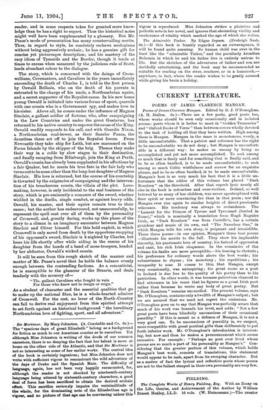Sir Mortimer. By Mary Johnston. (A. Constable and Co. Os.)—
The "spacious days of great Elizabeth" belong as a background for fiction as much to our American cousins as to ourselves. Yet although lass Johnston is writing of the deeds of our common ancestors, there is no denying the fact that her talent is more at home on the other side of the Atlantic, and that Sir Mortimer is not so interesting as some of her earlier works. The central idea of the book is certainly ingenious; but Miss Johnston does not write with sufficient vigour to reconstruct the wild adventure of the days of Drake and the Spanish Main. The difficulty of language, again, has not been very happily surmounted, for, although the reader is not shocked by nineteenth-century language being uttered by sixteenth-century characters, a good deal of force has been sacrificed to obtain the desired archaic effect. This sacrifice seriously impairs the verisimilitude of the whole, for the dominating note of the Elizabethan age is vigonr, and no picture of that age can be convincing unless this
vigour is reproduced. Miss Johnston strikes a plaintive and pathetic note in her novel, and ignores that abounding virility and exuberance of vitality which marked the age of which she writes.
The Admirable Tinker. By Edgar Jepson. (Eveleigh Nash. 6s.)—If this book is frankly regarded as an extravaganza, it will be found quite amusing. No human child was ever in the least like the " admirable Tinker," and the peculiarly Arcadian Bohemia in which he and his father live is entirely untrue to life. But the sketches of the adventures of father and son are decidedly entertaining, and the book may be recommended as suitable for reading on the river, seashore, or in a hammock,— anywhere, in fact, where the reader wishes to be gently amused while giving his brain a holiday.










































 Previous page
Previous page